Download. Updated White Paper.
De-Risk Drug Development by Predicting the Placebo Response
With estimated trial success rates of only about 14%, clinical trials can no longer ignore the influence of patient psychology on response to placebo and treatment.
Placebo response is a major source of clinical trial failures—the consequences ranging from extended development costs and timelines to premature abandonment of an otherwise efficacious drug.
How can sponsors increase trial success rate, accelerate timelines and reduce cost? By predicting (not reducing) the placebo response.
In this white paper, we provide data and actionable steps to help you:
- Understand the challenge of the placebo effect in Phase II and III clinical trials.
- Replace historically ineffective methods to reduce the placebo response with an effective method based on predictive models.
- Improve clinical trial power by 12-14% and reduce the risk of trail failure.

About Placebell©™
The Placebo Response Insurance Policy Your Trial Deserves
Placebell©™ offers a sophisticated, yet simple, AI-based method to predict and account for individual patients’ placebo responsiveness in clinical trials—instead of excluding placebo responders or reducing placebo response. Deployed with only minimal changes to protocols and with no risk to your data analysis, Placebell©™ helps sponsors bring life-saving therapies to market safely and efficiently.
